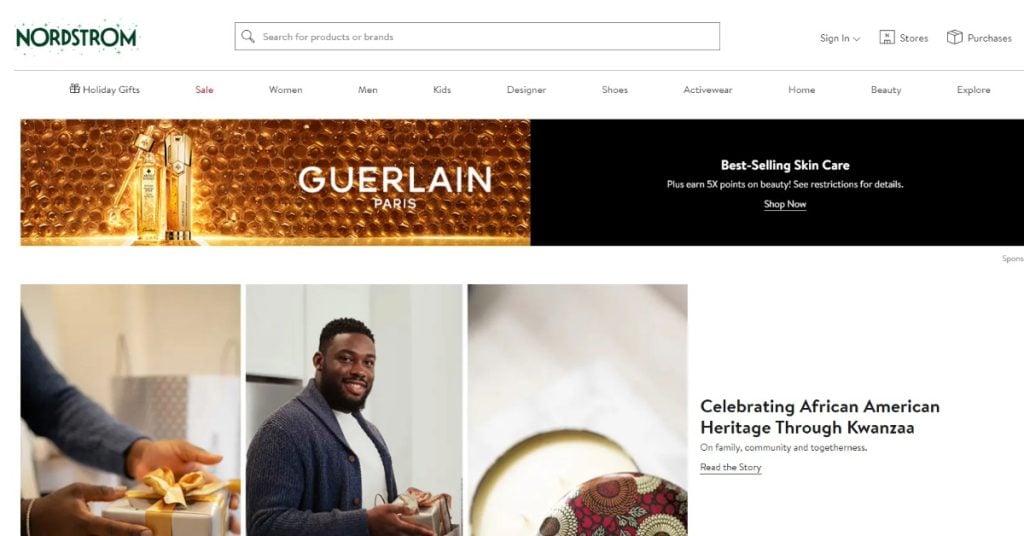
Nordstrom marketplace case study: book a demo to start yours
Nordstrom is a renowned American luxury department store brand recognized for its upscale fashion products, such as apparel, shoes, accessories, and beauty items. If you’d like to start your own marketplace like Nordstrom, you’re facing a buy vs build decision. So before you decide to build it in-house on top of Spree open-source, consider using the feature-rich Enterprise Edition cutting your time-to-market to a few weeks.
Build vs Buy a marketplace?
The benefits of using open-source are numerous, including complete control and the ability to customize freely. However, these perks come with significant expenses. Crafting a fully functional marketplace solution is a lengthy and costly process, often spanning months or even years. This is a lesson we’ve drawn from various marketplace projects.
If speed and reliability are your priorities, choosing a pre-built, enterprise-ready solution like Spree Commerce Enterprise Edition is the practical path backed by the experience of those who know how unpredictable and risky custom marketplace development can be.
Back to the Nordstrom marketplace case study
Nordstrom, a century-old upscale fashion retailer, has evolved from its humble beginnings as a small shoe store in Seattle to a major player in the fashion industry. Founded in 1901 by John W. Nordstrom and Carl F. Wallin, the company’s growth has been significantly influenced by the Nordstrom family, with the fourth generation still actively involved in its operations.
Nordstrom’s primary revenue comes from the sale of merchandise through its department stores and a strong online presence. It offers a curated selection of high-quality, fashionable items, including clothing, accessories, beauty products, and home goods, catering to a diverse customer base. Nordstrom Rack, the company’s off-price retail division, contributes significantly to its revenue by offering discounted prices on products from Nordstrom’s regular stores.
Nordstrom has successfully expanded its online presence, which has become a significant revenue stream. The company has invested in user-friendly interfaces, efficient delivery services, and customer support. Additionally, the Nordstrom Rewards program incentivizes customers to shop more frequently and spend more money, leading to increased sales.
The company’s strengths include its strong brand reputation, extensive product range, omnichannel presence, and personalized shopping experience. However, it also faces weaknesses like high prices, limited international presence, and reliance on physical stores. Opportunities for Nordstrom include e-commerce growth, international expansion, and collaboration with influencers. Challenges include intense competition, vulnerability to economic downturns, and the need to adapt to changing consumer preferences.
Financially, for the second quarter of 2023, Nordstrom reported net earnings of $137 million, or earnings per diluted share (EPS) of $0.84, and earnings before interest and taxes (EBIT) of $192 million. Net sales decreased 8.3% compared to the same period in 2022, reflecting challenges such as the wind-down of Canadian operations.
Despite these challenges, sectors like active and beauty, kids’ apparel, and men’s apparel showed growth. Digital sales, representing 36% of total sales, decreased 12.9% compared to the same period in 2022.
How to emulate Nordstrom marketplace success?
If you’re looking to replicate Nordstrom’s success, you might want to get your marketplace going sooner, in weeks rather than months. Check how your product lineup matches your audience’s interests and continually refine how you draw in customers based on real-world evidence.
Initially, test the market before investing heavily in building it.
Here’s how to get started:
- Book a marketplace demo call: We’ll help you evaluate Spree for your marketplace needs and get started with the Enterprise Edition
- Customize your Storefront: Use the drag & drop page builder or custom CSS
- Onboard Brands: Invite your brands or choose brands from our catalog
- Select Products: Curate products and collections manually or automate it
- Embed products: Make your content, newsletters, social media shoppable
- Get Paid: Get paid as soon as products are shipped by the brands
- End-to-end automation: Brands sync, fulfillment, payouts, invoicing, taxes
When you’ve tried all that and it works, start thinking about building your own, custom-made marketplace project based on Spree Commerce. First, by decoupling the storefront and going headless with marketplace API, and later with your own backend, if you decide you really need it. Just lift and shift the storefront.
Nobody has to know what’s under the hood, right?



